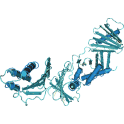
- Remove this product from my favorite's list.
- Add this product to my list of favorites.
Products
Newsletter
 |  |  |  |  |  |

Background: Plk1 is a serine/threonine kinase and one of the polo-like kinase family members. The mammalian family of polo-like kinases consists of at least five described members, polo-like kinases 1–5 (Plk1-5), which are central regulator of cell division required for several events of mitosis and cytokinesis. The expression of Plk1 begins to increase from S/G2 phase, and its activity peaks at mitosis. The kinase is involved in centrosome maturation, kinetochore-microtubule attachment, bipolar spindle formation and cytokinesis. Deregulated expression of Plk1 accelerates cell division abnormally and promotes tumorigenesis. Plk1 is composed of two functional domains; one is the kinase domain and a polo-box domain on C-terminal for targeting of substrate and involving in its subcellular localization.
Protein: Recombinant, human serine/threonine-protein kinase PLK1, amino acids M1-S603, N-terminally fused to GST-HIS6-Thrombin cleavage site
Theoretical MW (PLK1) 99.3 kDa (fusion proteins)
Expression system: Baculovirus infected Sf9 cells
Purification: One-step affinity purification using glutathione agarose
Storage buffer: 50 mM Tris-HCl, pH 8.0; 100 mM NaCl, 5 mM DTT, 4 mM reduced glutathione, 20% glycerol
Protein concentration: 0,147 mg/ml (Bradford method using BSA as standard protein)
Method for determination of Km value & specific activity: Filter binding assay MSPH membrane
Specific activity : 152,000 pmol/mg min
Entrez Gene ID: 5347
UniProtKB: P53350
Ordering information: shipped on dry ice
Cholewa BD, Liu X, Ahmad N. (2013 ) "The role of polo-like kinase 1 in carcinogenesis: cause or consequence?" Cancer Res. 73(23):6848-55.
Hyun SY, Hwang HI, Jang YJ. (2014) "Polo-like kinase-1 in DNA damage response." BMB Rep. 47(5):249-55
Li S, Zhang Y, Xu W1. (2013) "Developments of polo-like kinase 1 (Plk1) inhibitors as anti-cancer agents."Mini Rev Med Chem. 13(14):2014-25.
Welcome Login
Contact us
Follow us